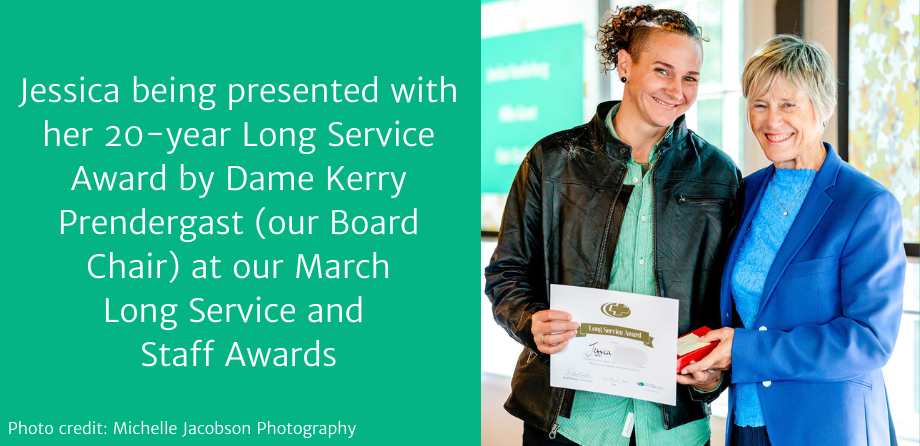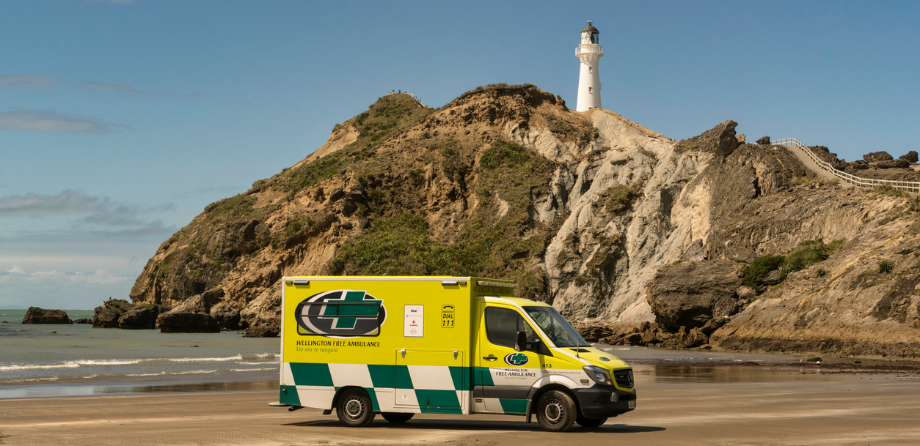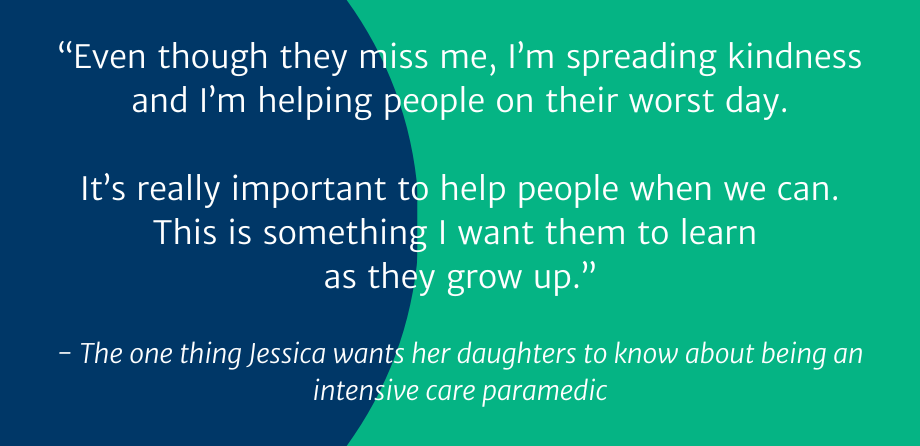About us
Our news
Meet Intensive Care Paramedic Jessica
Meet Intensive Care Paramedic Jessica
 08 May 2025
08 May 2025
Meet Intensive Care Paramedic Jessica
Jessica recently celebrated 20 years of paramedic service to the community! As well as being an intensive care paramedic, Jessica has another equally important job: mum to Georgia (6) and Lily (4). Read about how Jessica manages the demands of shift work alongside parenting.

Jessica’s career in paramedicine began in her homeland of America. After completing a 4-year university degree in biology, she knew she didn’t want to go into further research. As she explains: “I had an interest in first aid because of a course I did in high school. First aid came pretty naturally to me, so I decided to enrol at paramedic school and become an EMT [emergency medical technician].”
Jessica quickly progressed in her paramedicine career, becoming an ICP [intensive care paramedic – a paramedic who has extra training to provide advanced care to critically ill patients] while “really young” – in her early 20s.
For 5 years, she worked as an ICP at an Austin, Texas-based ambulance service before an opportunity came up to move to Aotearoa New Zealand.
Jessica explains “I went straight from university to paramedic school. I didn’t travel or anything. So when the opportunity to move to New Zealand came up, I jumped at it. I never meant to stay this long!”.
Making the move
When Jessica moved, the then-Wairarapa District Health Board “needed ICPs quite badly so I got a job pretty quickly”.
Straightaway, Jessica “liked the beautiful Wairarapa area. I loved that there was lots of outdoors things to do. Because I’m from a city, I loved that it was close to Wellington – and the Wairarapa made Wellington feel like a big city!”. Settling in the Wairarapa was a “no brainer” for Jessica.
As well as loving where she was based, Jessica thought “the job was fantastic. It was unlike anything else you can find in the world. I was the only ICP on shift yet because I wasn’t in a metropolitan area, I wasn’t run off my feet. Instead, I could stay on top of everything. I feel like I utilised my skills a lot more here than I ever did in the US.”
It’s this that has led to such longevity in Jessica’s career – she recently celebrated 20 years of paramedic service to the community, those most recent years with Wellington Free.

Staying the course
What keeps Jessica at Wellington Free is simple – she “loves being a paramedic”. She goes on:
“I really enjoy the autonomy of my role and am so proud of what we do. We’re a small service but I believe we’re on the cutting edge of processes and technology and competitive to the entire world. In my experience, we do more things than some places in the US.”
“I feel like we’re really trusted as clinicians and have quite a progressive set of guidelines [a resource that guides the care of patients - the Clinical Practice Guidelines, also known as CPGs].”
Jessica laughingly admits that “I couldn’t do a 9-5 office job; it wouldn’t keep my attention. I get bored easily. But as an ICP I’m never bored, it’s always challenging.”
“Every day, I don’t know what I’m going to get, and I have to figure it out on the spot. I love it!”
A day in the life
As an ICP, Jessica is “responsible for leading clinically on big jobs”. She also provides team leadership. Jessica describes the Wairarapa team as “really strong and a close-knit family. We work really well with each other. We know each other’s strengths and weaknesses.”
“Everybody chips in to get the job done.”
What Jessica loves the most about her job is that “I get to serve the community in which I, and my family, also live in. I get a great sense of accomplishment from that”.
“The Wairarapa may be geographically vast but it’s a small area population-wise. This means I feel really appreciated by people.”
“Providing such an essential service to the community feels good to me.”
On juggling parenthood and shift work

Being a paramedic is a demanding job, involving a rostered pattern of day shifts and night shifts with days off between each block of work. While all paramedics get regular leave blocks every three months, the shift pattern does repeat across the entire year.
Outside of work, Jessica has an equally important job – mum to Georgia and Lily. She explains that “although shift work is not thought of as family friendly, actually when I’m on night shifts I can be available during the day, unlike parents who work 9-5. Sure, I’m tired but it makes things easier to be around during daytime! Also, when I’m on night shifts, I can pick up my oldest daughter from school before I have to go to work.”
During her day shifts, Jessica’s daughters have a co-parent who cares for them. Jessica admits that “the 12-hour day shifts are rough. It feels like a long time to be away from my daughters”.
“But the time away makes the moments with them even more valuable and sweeter. I treasure our time together and I’m always ‘on’ when I’m with them.”
What’s Jessica’s secret to managing the juggle of parenthood and shift work?
Sleep!
Thanks to their young ages (4 and 6), Jessica’s daughters have an early bedtime. She laughs that “it’s so tempting to clench at those adult hours after they go to bed. But my oldest daughter always asks, ‘how much longer are you going to stay up?’ And honestly, it’s normally about 30 to 60 minutes after they go to bed that I’m in bed too! I rest when they do.”
Keeping it in the family
Jessica’s daughters know what mum does for a living. In fact, they know the ambulance that she drives and “they always look out for me”. Many times, Jessica’s driven past them when she’s been in the ambulance – another lovely aspect to serving the community in which she lives.
The one thing Jessica wants her daughters to know about being an ICP is “even though they miss me, I’m spreading kindness and I’m helping people on their worst day.”
“It’s really important to help people when we can. This is something I want them to learn as they grow up.”